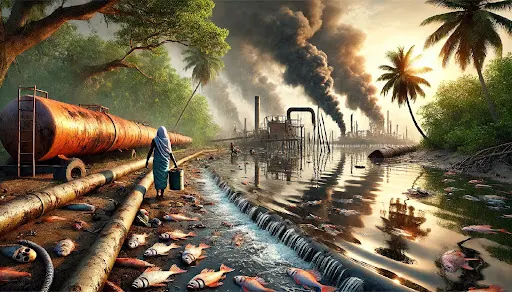By Ephraim Agbo
The Big Questions
- How do multinational corporations evade accountability for environmental destruction?
- Why do billion-dollar cleanup initiatives often fail to deliver real change?
- Should environmental harm be classified as a human rights violation?
- Does the upcoming legal battle against Shell signal the dawn of true corporate responsibility, or will it be another chapter in the cycle of impunity?
A Legacy of Oil and Suffering
For overs 60 years, oil extraction in Nigeria’s Niger Delta has powered global economies while devastating local communities. Polluted rivers, toxic air, and oil-soaked farmlands define the daily reality for millions.
Now, as Shell faces a landmark trial in London, new revelations expose widespread corruption and failures in a billion-dollar cleanup effort meant to repair the damage. The case could set a global precedent for holding corporations accountable for environmental harm.
But the world must ask: Will justice finally be served, or will this be another case of corporate evasion?
The Niger Delta Crisis: A Catastrophe in Numbers
- Over 13 million barrels of oil have been spilled since drilling began in 1958—one of the world’s worst ecological disasters.
- A 2011 UN report found benzene levels in drinking water 900 times above safe limits, posing severe health risks.
- Despite Shell’s commitment to a $1 billion cleanup, less than 11% of contaminated sites have been treated, and none have been fully restored.
- The average life expectancy in the Niger Delta is 10 years lower than the national average, largely due to pollution-related illnesses.
The Big Question: If corporations profit from natural resources, should they also bear full responsibility for the damage they cause?
The $1 Billion Cleanup That Went Nowhere
After the UN Environment Programme (UNEP) exposed the environmental disaster in Ogoniland, a 30-year remediation plan was launched in 2016. The Nigerian government, backed by Shell, established the Hydrocarbon Pollution Remediation Project (HYPREP) to clean up contaminated sites.
Yet, nine years later:
- More than 60% of funding remains unaccounted for due to corruption and mismanagement.
- 21 of 41 contractors hired for cleanup had no expertise in environmental remediation.
- Independent tests show many “cleaned” areas remain dangerously toxic.
The Big Question: Why do large-scale environmental remediation efforts so often fail to deliver meaningful results?
Human Cost: A Public Health and Economic Crisis
Toxic Water and Deadly Consequences
- Communities like Ogale and Bodo rely on water laced with cancer-causing chemicals.
- Residents spend half their daily wages on imported clean water.
- Respiratory illnesses, skin diseases, and cancer rates have surged.
Environmental Devastation
- Once-thriving mangrove forests have disappeared, wiping out natural defenses against flooding.
- Fish stocks have declined by over 90%, eliminating a primary source of food and income.
The Big Question: Why are environmental crimes tolerated in Africa when similar disasters in the West lead to swift action?
Shell’s Role: Negligence or Strategic Evasion?
Shell insists it no longer operates the sites and blames sabotage and oil theft for the ongoing pollution.
Yet, leaked documents reveal:
- Shell knew about fraud within HYPREP but did nothing to intervene.
- Internal emails show executives privately acknowledging the failures while publicly denying responsibility.
- Shell is now selling its onshore operations in Nigeria for $2.4 billion, raising concerns it is exiting to avoid future liability.
The Big Question: Should corporations be allowed to divest from polluted assets without first ensuring proper cleanup?
A Landmark Case in London: The Beginning of Corporate Accountability?
On February 13, 2025, two Niger Delta communities—Ogale and Bille, representing 80,000 people—will bring their case against Shell to London’s High Court.
The lawsuit could set a historic legal precedent by determining:
- Can Shell be held liable for human rights violations due to environmental destruction?
- Should Shell be responsible for oil spills linked to theft and pipeline vandalism?
If the court rules against Shell, it would be the first time a UK multinational is held accountable for environmental damage abroad under human rights law.
The Big Question: If Shell is found guilty, will this open the door for holding other corporations accountable for environmental harm worldwide?
A Global Call for Action
The Niger Delta crisis is not an isolated event—it reflects a wider pattern of corporate impunity in resource-rich but politically weak regions.
What Must Change?
-
Global Environmental Accountability Laws
- Nations must enforce binding legal standards for corporate responsibility, ensuring that companies clean up after themselves.
-
Stronger Oversight on Cleanup Efforts
- International watchdogs should oversee billion-dollar remediation projects to prevent corruption.
-
Recognition of Environmental Destruction as a Human Rights Violation
- Courts must begin treating environmental damage not just as an economic issue, but as a crime against humanity.
The Final Question: Will this legal battle force corporations to finally respect environmental and human rights—or will it be another example of justice delayed, justice denied?
Sources & References
This report is based on investigations by BBC, Amnesty International, Associated Press, UNEP, Freedom of Information requests, satellite data, and legal documents.
Join the Conversation
Is it time for stronger global regulations to hold corporations accountable for environmental damage? Share your thoughts.












No comments:
Post a Comment